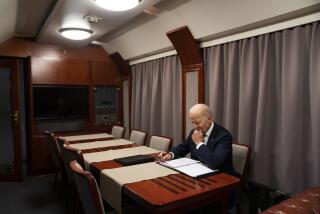The Times Poll : Deficit Stirs More Concern Than Tax Plan
Public attitudes toward tax reform have shifted dramatically since earlier this year, with four out of every five Americans now calling on the federal government to reduce the massive federal budget deficit before trying to revamp the nation’s tax system, a Los Angeles Times Poll has found.
In January, before President Reagan officially unveiled his tax plan, a Times survey showed that nearly two out of every three taxpayers believed that the federal government’s first priority should be reforming the tax system rather than reducing the deficit. Sixty percent of those polled at the time said they favored Reagan’s plan, and 34% opposed it.
Nine months later, with Americans more familiar with the tax proposal, sentiment has changed.
The new survey found, by a 4-1 margin, that Americans believe reducing the deficit should be an immediate priority over tax reform. Support for Reagan’s proposal is now divided, with about as many Americans against it as in favor.
Low Marks for Policies
The nationwide poll was conducted over six days, ending Thursday, by Los Angeles Times Poll Director I.A. Lewis. Interviewers questioned 1,967 Americans by telephone. In addition to revealing dwindling support for tax reform, the poll found that many Reagan policies fail to win high marks despite the President’s strong overall job rating.
Fifty-eight percent of those polled said they believe that Reagan is doing a good job overall. In July, a Times Poll found that 63% approved of his performance.
Most of those surveyed expect Congress to revise Reagan’s tax proposal drastically, and most do not believe that any reform package will win approval this year. About half of those polled believe that there will be a tax increase this year.
“The more people find out about the tax plan, the more suspicious and wary they become,” said William Schneider, a senior fellow at the American Enterprise Institute in Washington and The Times’ political analyst. “The Administration has not effectively communicated what people stand to gain.”
Slippage in Support
Schneider noted that polls began showing a slippage in support in the spring, even though majorities still favored the plan at the time. He attributed much of that decline to the way the Administration has handled the proposal.
‘An Abstract Good’
Instead of focusing on the proposed lower tax rates, Americans see the main benefit of reform as a way to make the system more fair. “They’re choosing between an abstract good and a very practical, self-interested negative,” Schneider said. Even Americans who do not benefit from many of the currently allowed deductions want them to remain, he said.
‘Tempering of Sympathy’
“In this present bout with Congress,” Lewis said, “Reagan doesn’t seem to have as much support of the American people on the issues involved. There has been a tempering of the sympathy that went with his last rating when he was diagnosed as having cancer.”
Americans were almost evenly divided over whether Reagan’s recently ordered sanctions against South Africa were strong enough, with most describing his steps to ban bank loans and the sale of certain technology to the white-minority regime as appropriate. Fewer than 10% said they favored weaker sanctions.
Foreign Policy Rating
Overall, support for Reagan’s handling of foreign policy has diminished since January, when 59% approved of his policies. The new survey shows that 41% support his handling of foreign relations and that 31% are dissatisfied.
When asked whether they would describe today’s economy as good, bad or in-between, most respondents said “in-between.” By a substantial margin, those polled said their biggest economic fear was unemployment. Twice as many Americans rated unemployment as a more serious threat than inflation, their second biggest concern.
The survey showed that Americans do not believe that the government is doing a good job in trying to resolve the farm crisis. By a 2-1 margin, they said they dislike Reagan’s handling of the situation. But they also dislike congressional legislation that would bail out debt-ridden farmers by reducing grain cultivation and raising price supports for commodities.
Americans continue to oppose covert CIA support for the rebels fighting the government in Nicaragua, although opposition appears to have softened. Forty-three percent said they were against such aid, compared with 16% in favor. In February, 76% said they opposed covert support, and 17% favored it.
More to Read
Get the L.A. Times Politics newsletter
Deeply reported insights into legislation, politics and policy from Sacramento, Washington and beyond. In your inbox three times per week.
You may occasionally receive promotional content from the Los Angeles Times.











